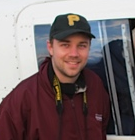
| Event Details |
|---|
|
Monday, April 6, 2015 Talk:
3:45 p.m. - 4:45 p.m., 115 Avery Hall
Reception:
3:30 p.m. - 3:45 p.m., 348 Avery Hall
|
Stephen Nuske, Ph.D
Senior Project Scientist, Robotics Institute at Carnegie Mellon UniversityAbstract
Automated systems for helicopter landings, navigating rivers, and precision agriculture are examples of field robotic applications where computer vision is an attractive, if not necessary, perceptual mechanism due to its small size, low weight, long working range, and the rich nature of the information it provides. Although a very promising perceptual tool, computer vision has been under-utilized in outdoor field robotics environments because of the difficulties creating reliable systems. It is the harsh nature of the environments that is especially challenging for computer vision systems. The long-standing problems for vision systems -- variability in image content due to lighting, scale/rotations and dynamic scenes -- are exacerbated in field robotics conditions. Methods are presented that deal with three key issues faced in field robotics; 1. Dynamic and non-uniform lighting; 2. Accurate estimation of long-range scenes; 3. Segmenting images and object detection in challenging environments. By surmounting these challenges, computer vision systems are beginning to realize the profound impact to field robotic scenarios that has been long anticipated.
Speaker Bio
Stephen Nuske is a Senior Project Scientist in the Robotics Institute at Carnegie Mellon University. He was a PostDoc with Prof. Sanjiv Singh at the Robotics Institute from 2008-2010. He completed his PhD in Australia at the University of Queensland and the Commonwealth Science and Industry Research Organisation. He has developed numerous novel systems for agricultural, industrial and aerial vehicle applications realizing robust and efficient computer vision systems that can localize, track, detect, segment in challenging field robotics environments.